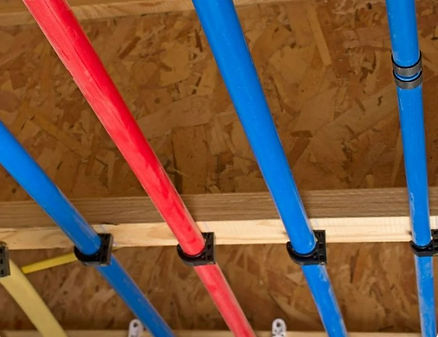Water Lines
Residential water lines are the pipes that bring fresh water into a home for use. They are typically made of materials such as copper, PVC (polyvinyl chloride), or PEX (cross-linked polyethylene). Copper pipes are durable and have been used for many years but they are more expensive than other options. PVC and PEX are newer types of pipes that are less expensive. PEX tubing's flexibility simplifies installation in tight or tricky spaces.
Homeowners need to know the location of the main shut-off valve, which is typically located near the property line or where the water line enters the home. This valve can be used to shut off the water supply in case of a leak or other emergency. Being knowledgeable of the type of pipes used in your water line is important, as different types have different lifespans and may require different types of maintenance.
Regular maintenance of water lines ensures that they are functioning properly and to prevent leaks. This can include regular inspections, pressure testing, and flushing of the lines. Additionally, if you have an older home, it may be a good idea to have the water lines inspected to ensure that they are in good condition and free of leaks.
It critical for residents in older home to be aware of the material of their pipes. If you have an older home, lead pipes may have been used in the past. Lead pipes can cause lead contamination in the water, which can be harmful to human health. If you suspect that your home has lead pipes, it is important to have them tested and potentially replaced. Learn more about lead in drainking water here.
Customers who reside in Quincy may have received survey information regarding their water service. If you are unsure of which material your water line is made of, our technicians can help. Call to schedule a site visit.

10 Important Things to Know About Water Lines:
-
The location of the main shut-off valve, which is typically located near the property line or where the water line enters the home. This valve can be used to shut off the water supply in case of a leak or other emergency.
-
The type of pipes used in your water line, as different types have different lifespans and may require different types of maintenance. Common materials used include copper, PVC, and PEX .
-
Regular maintenance of water lines is important to ensure that they are functioning properly and to prevent leaks. This can include regular inspections, pressure testing, and flushing of the lines.
-
If you have an older home, it may be a good idea to have the water lines inspected to ensure that they are in good condition and free of leaks.
-
If you suspect that your home has lead pipes, it is important to have them tested and potentially replaced as lead pipes can cause lead contamination in the water, which can be harmful to human health.
-
Knowing the age of the water lines, if they are old they may need replacement.
-
Knowing the size of the water lines, if they are too small, they may not be able to supply enough water to the house.
-
Knowing the location of the water meter and how to read it, this can help in detecting leaks and keeping track of water usage.
-
Knowing the location of the water main and how to turn it off in case of emergency.
-
Knowing the water pressure, if it is too high it can cause damage to the pipes and appliances, if it is too low it may not be able to supply enough water to the house.
If the list above leaves you with questions or concerns about your own water pipe system, call us for a site visit. One of our expert technicians can perform a walk through with you to identify the important aspects of your homes water supply and answer any questions you may have. Call Today!
